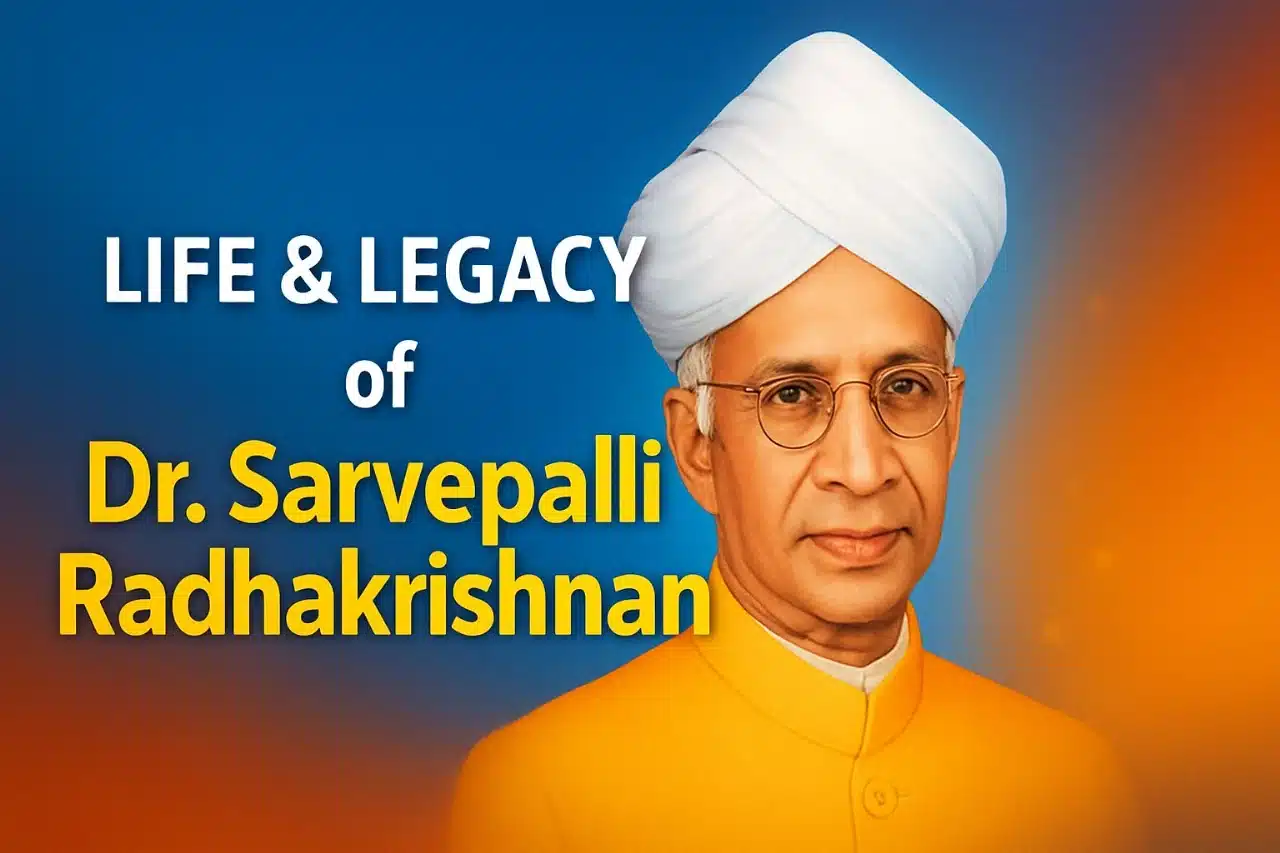Dr. Sarvepalli Radhakrishnan was born on 5 September 1888 in Tiruttani, Tamil Nadu, into a simple Telugu Brahmin family. From a young age, he loved learning and was deeply interested in spirituality, which later influenced his philosophy. He completed his early schooling in Tiruttani and Tirupati and went on to study at Madras Christian College, where he earned a Master’s degree in Philosophy at just 20. His ideas combined traditional Indian wisdom with modern thinking, highlighting the importance of education, moral values, and the unity of all religions.
Why India Celebrates Teacher’s Day
Every year, India celebrates Teachers’ Day on 5 September, which is Dr. Sarvepalli Radhakrishnan’s birthday. When his students wanted to celebrate him, he humbly suggested that the day should honor all teachers instead of himself. This simple but meaningful request became a national tradition, reflecting his deep respect for education and the important role of teachers in shaping lives.
Dr. Sarvepalli Radhakrishnan Early Life
Dr. Sarvepalli Radhakrishnan was born on 5 September 1888 in Tiruttani, Tamil Nadu, into a Telugu Brahmin family. His father worked as a junior revenue officer, and the family lived modestly. From a young age, Radhakrishnan showed remarkable curiosity and intelligence, standing out among his peers. Growing up immersed in Indian culture and spirituality, he developed the foundations that later shaped his philosophy and lifelong pursuit of knowledge.
- Born: 5 September 1888, Tiruttani, Tamil Nadu
- Family: Telugu Brahmin, modest financial background
- Childhood marked by discipline, simplicity, and curiosity for learning
Dr. Sarvepalli Radhakrishnan Education
Radhakrishnan did his early schooling in Tiruttani and Tirupati before joining Madras Christian College for higher studies. By the age of 20, he had completed his bachelor’s degree in philosophy and went on to earn a master’s in the same field. His studies combined Indian scriptures like the Upanishads, Bhagavad Gita, and Vedanta with the ideas of Western philosophers such as Plato and Kant, helping him develop a unique, comparative approach to philosophy.
- Early schooling: Tiruttani & Tirupati
- College: Madras Christian College
- Degrees: Bachelor’s and Master’s in Philosophy
- Academic Influence: Blend of Indian texts and Western philosophy
Dr. Sarvepalli Radhakrishnan Family and Personal Life
At the age of 16, Dr. Radhakrishnan married Sivakamu, and together they had six children. One of their sons, Sarvepalli Gopal, went on to become a respected historian and scholar. Even with a demanding academic and political career, Radhakrishnan led a disciplined and humble life, valuing simplicity, balance, and strong respect for traditional Indian values, which he instilled in his family.
Dr. Sarvepalli Radhakrishnan Academic Career
Radhakrishnan began his teaching career as a lecturer in philosophy at Presidency College, Madras, at just 21 years old. His clear explanations and unique interpretation of Indian philosophy earned him recognition as a brilliant teacher. Over the years, he worked at Mysore University, Calcutta University, and Oxford University, where he introduced Indian thought to the West. He also served as Vice-Chancellor of Andhra University and Banaras Hindu University, shaping them into major centers of learning.
- Lecturer at Presidency College, Madras (1909)
- Professor at Mysore University (1918)
- Philosophy Chair at Calcutta University (1921)
- Vice-Chancellor of Andhra University (1931-1936)
- Vice-Chancellor of BHU (1939-1948)
- Spalding Professor at Oxford (1936-1952)
Dr. Sarvepalli Radhakrishnan Political Career
Dr. Radhakrishnan’s political career began after independence, when he represented India at UNESCO and later served as Ambassador to the Soviet Union (1949-1952). His diplomatic skills strengthened India’s relations during the early Cold War period. He was elected as India’s first Vice-President (1952-1962), and later as the second President of India (1962-1967). As President, he was admired for his intellectual depth, humility, and ability to lead the nation with dignity.
Dr. Sarvepalli Radhakrishnan Philosophy
Radhakrishnan’s philosophy was a blend of Advaita Vedanta and modern rational thought. He believed that all religions lead to the same ultimate truth, stressing the unity of mankind. For him, education was not just about knowledge but about building character, nurturing values, and guiding individuals toward self-realization. His writings helped the West understand Indian spirituality in a scientific and comparative manner.
- Unity of world religions and human values
- Education must combine intellect with moral development
- Spirituality and rational inquiry should coexist
- Philosophy should guide social and national progress
Dr. Sarvepalli Radhakrishnan Rewards & Honours
Dr. Radhakrishnan’s contributions earned him prestigious awards and global recognition. He was awarded the Bharat Ratna in 1954, the highest civilian award of India. He was nominated multiple times for the Nobel Prize in both Literature and Peace. His international recognition included honorary memberships, fellowships, and awards from various institutions worldwide.
- Bharat Ratna in 1954
- Nominated for Nobel Prize 27 times (16 in Literature, 11 in Peace)
- Honorary Doctorates from universities across the world
- Order of Merit (UK) in 1963
Dr. Sarvepalli Radhakrishnan Death
Dr. Sarvepalli Radhakrishnan passed away on 17 April 1975 in Chennai after living a life devoted to teaching, philosophy, and serving the nation. His death was seen as the loss of a great leader and thinker who inspired generations. Today, his birthday on 5 September is celebrated as Teachers’ Day to honor his love and respect for teachers.
Dr. Sarvepalli Radhakrishnan FAQs
Q1. Why is Teachers’ Day celebrated on 5 September in India?+
Q2. What were Dr. Radhakrishnan’s major works?+
Q3. Which awards did Dr. Radhakrishnan receive?+
Q4. What was Dr. Radhakrishnan’s philosophy of education?+
Q5. When did Dr. Radhakrishnan serve as President of India?+




